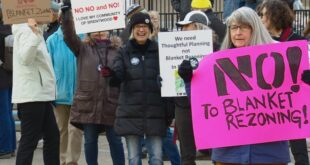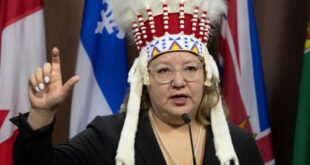Court agrees that Cindy Dickson's Charter rights were breached, but residency requirement is still protected

The country's highest court has upheld a requirement from a Yukon First Nation that elected officials live on settled land and dismissed an appeal from Cindy Dickson, a resident, that her Charter rights were violated by that requirement.
In a decision released Thursday morning, the Supreme Court of Canada ruled that the Vuntut Gwitchin First Nation (VGFN)'s residency requirement is constitutional.
"The residency requirement protects Indigenous difference," the court wrote. "Requiring VGFN leaders to reside on settlement land helps preserve the leaders' connection to the land, which is deeply rooted in the VGFN's distinctive culture and governance practices."
In a split decision, the court ruled the Charter does apply to the VGFN's residency requirement because the First Nation is considered a government body.
"The Charter applies to the residency requirement because its enactment and enforcement by the VGFN constitutes a specific governmental activity."
The Supreme Court's ruling echoes decisions made by the lower courts.
Dickson began her legal challenge in 2019, after she was prevented from running for Vuntut Gwitchin council because she lived in Whitehorse. The Vuntut Gwitchin government is based in Old Crow, Yukon, a fly-in community about 800 kilometres north of Whitehorse.
At the time, the Vuntut Gwitchin government required all candidates to reside on settlement land. It later changed the requirement so that councillors have to move to settlement land within 14 days of being elected.
Dickson argued to the Yukon Supreme Court the First Nation's residency requirement infringed on her equality rights as guaranteed under the Charter. The First Nation argued it had never consented to the application of the Charter during its self-government negotiations with Canada, and that it had an inherent right to govern itself and preserve its culture and traditions.
A Yukon Supreme Court judge ruled in 2020 that the Charter was applicable to the Vuntut Gwitchin government and that while the 14-day timeline for councillors to move to Old Crow was unconstitutional, the residency requirement itself could stand.
Charter rights breached
The case mainly centered around three Charter issues: whether the Charter applies to the VGFN, whether Dickson's rights were violated and whether that violation could be trumped by the Charter's protection of Indigenous rights.
In other words, the court had to decide whether the VGFN is a self-governing government and whether the Charter applies to it.
"The Charter applies to the VGFN and to its citizens like Ms. Dickson, principally, but not only, because the VGFN is a government by nature," the court wrote.
The court also said while Dickson's Charter rights were breached, it was justified under a section of the Charter that protects collective Indigenous rights.
That means that section acts as shield to protect the residency requirement from Dickson's claim.
"This distinction on the basis of her non-resident status reinforces and exacerbates the historical and continuing disadvantage faced by Indigenous people living away from their traditional lands.
But Justices Sheilah Martin and Michelle O'Bonsawin dissented on that point, saying that Charter challenges should be able to be taken to court without being stopped by Section 25.
'A landmark moment'
Vuntut Gwitchin Chief Pauline Frost said on Thursday she was happy with the decision and that it provides more clarity around their legislation.
"This provides more certainty for us," she said.
Bridget Gilbride, Dickson's lawyer, told CBC in a statement that she was disappointed by the decision, but also pleased that the court found that Vuntut Gwitchin citizens hold Charter rights in relation to their Indigenous government.
Gilbride said she's happy the decision recognizes Indigenous self-governments as governments under Canadian law, calling it "an advancement for Indigenous peoples in Canada."
Ryan Beaton, a Vancouver-based lawyer who specializes in cases involving Indigenous rights and title, said the ruling sets a precedent about how the Charter applies to Indigenous self-governments.
"It's a landmark moment," Beaton said. "That work is being taken up by the courts to begin to give the framework of how Indigenous law relates to the rest of Canadian constitutional law."
Beaton said there is nothing in the Charter that says it should apply to self-government.
"That's a big question that the court answered today that it hadn't previously," Beaton said.
Beaton also said the ruling opens the door for Indigenous groups currently negotiating self-government agreements to argue how the Charter should or should not apply to them.
Kris Statnyk, the VGFN's lawyer and also a member of VGFN, said the decision affirms the First Nation's right to self-government.
"That space has been preserved for us to continue to do that and pursue those objectives as a First Nation," Statnyk said. "These things that we fought hard for have a place and have importance in our lives."
ABOUT THE AUTHOR
Senior writer
Emma Tranter is a senior writer with CBC North in Yellowknife. She worked in journalism in Nunavut for five years, where she reported in Iqaluit for CBC, The Canadian Press and Nunatsiaq News. She can be reached at emma.tranter@cbc.ca.
With files from Julien Gignac and Jackie Hong
*****
Credit belongs to : www.cbc.ca
 MaharlikaNews | Canada Leading Online Filipino Newspaper Portal The No. 1 most engaged information website for Filipino – Canadian in Canada. MaharlikaNews.com received almost a quarter a million visitors in 2020.
MaharlikaNews | Canada Leading Online Filipino Newspaper Portal The No. 1 most engaged information website for Filipino – Canadian in Canada. MaharlikaNews.com received almost a quarter a million visitors in 2020.







